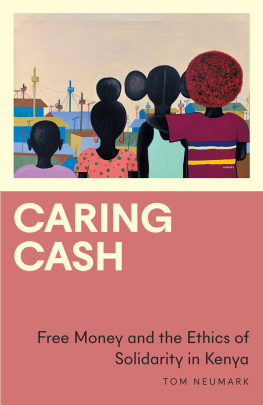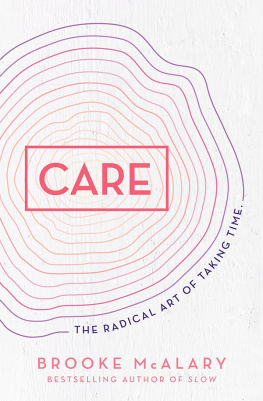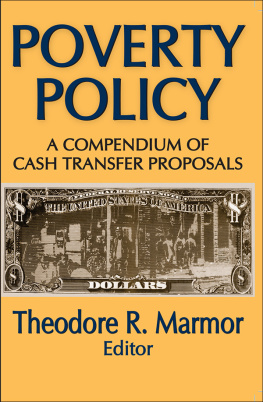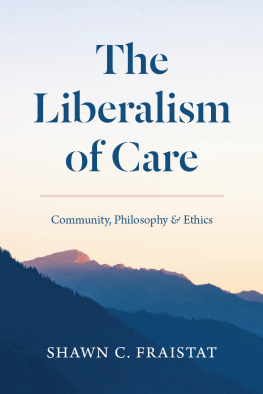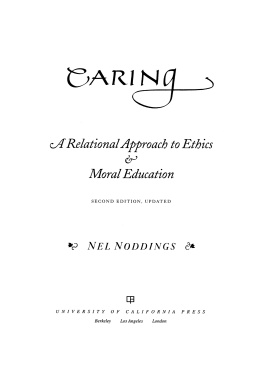Contents
Guide
Caring Cash
Across the world, welfare systems are being remade in the image of basic income. Tom Neumark powerfully intervenes in this debate by showing how Nairobis grant recipients experience care and violence, freedom and bureaucracy. It has implications far beyond Kenya.
Dr Kevin P. Donovan, University of Edinburgh
Tom Neumark approaches a key laboratory of twenty-first-century African experimentality, Unconditional Cash Transfers, from the recipients end, attending to relations of care and, notably, care for relations, among Nairobis urban poor. Instead of simply critiquing the obvious limitations of such programmes, Caring Cash explores their poetics of care and fragile ethics of solidarity, against the backdrop of a violently strained social fabric.
Paul Wenzel Geissler, Professor of Social Anthropology, University of Oslo
Caring Cash grapples with a contentious intervention in international development cash grant programmes in a caring yet critical way, rehabilitating this often-critiqued approach to poverty alleviation while unpacking its relative limited sustainability. Neumarks monograph interrogates both the discourse and its practitioners ethics. It is a must read for policy-makers and analysts; development workers and critics; Non-Governmental Organisation (NGO) employees and activists; and scholars of development studies and economic anthropology.
Chambi Chachage, Assistant Professor,
Institute of African Studies, Carleton University
This rich ethnography sees the care economy from multiple stances of Neumarks research participants programme bureaucrats, engaged social workers mediating a caring relationship between beneficiaries and NGOs, and recipients themselves, revealing a multifaceted set of understandings and motives. This book would be a great introduction to the cash grant literature for students and practitioners, so much of it being programmatic and policy oriented, and removed from describing the work that cash grants actually do.
Sibel Kusimba, Associate Professor of Anthropology,
University of South Florida
Anthropology, Culture and Society
Series Editors:
Holly High, Deakin University
and
Joshua O. Reno, Binghamton University
Recent titles:
The Limits to Citizen Power: Participatory Democracy and the Entanglements of the State
VICTOR ALBERT
The Heritage Machine: Fetishism and Domination in Maragateria, Spain
PABLO ALONSO GONZLEZ
Vicious Games: Capitalism and Gambling
REBECCA CASSIDY
Anthropologies of Value
EDITED BY LUIS FERNANDO ANGOSTO-FERRANDEZ AND GEIR HENNING PRESTERUDSTUEN
Ethnicity and Nationalism: Anthropological Perspectives Third Edition
THOMAS HYLLAND ERIKSEN
Small Places, Large Issues: An Introduction to Social and Cultural Anthropology Fourth Edition
THOMAS HYLLAND ERIKSEN
What is Anthropology? Second Edition
THOMAS HYLLAND ERIKSEN
Anthropology and Development: Challenges for the Twenty-first Century
KATY GARDNER AND DAVID LEWIS
Seeing like a Smuggler: Borders from Below
EDITED BY MAHMOUD KESHAVARZ AND SHAHRAM KHOSRAVI
How We Struggle: A Political Anthropology of Labour
SIAN LAZAR
Private Oceans: The Enclosure and Marketisation of the Seas
FIONA MCCORMACK
Grassroots Economies: Living with Austerity in Southern Europe
EDITED BY SUSANA NAROTZKY
Rubbish Belongs to the Poor: Hygienic Enclosure and the Waste Commons
PATRICK OHARE
The Rise of Nerd Politics: Digital Activism and Political Change
JOHN POSTILL
Base Encounters: The US Armed Forces in South Korea
ELISABETH SCHOBER
Ground Down by Growth: Tribe, Caste, Class and Inequality in Twenty-First-Century India
ALPA SHAH, JENS LERCHE, ET AL
Watershed Politics and Climate Change in Peru
ASTRID B. STENSRUD
When Protest Becomes Crime: Politics and Law in Liberal Democracies
CAROLIJN TERWINDT
Race and Ethnicity in Latin America Second Edition
PETER WADE
First published 2023 by Pluto Press
New Wing, Somerset House, Strand, London WC2R 1LA
and Pluto Press Inc.
1930 Village Center Circle, 3-834, Las Vegas, NV 89134
www.plutobooks.com
Copyright Tom Neumark 2023
The right of the author to be identified as the author of this work has been asserted in accordance with the Copyright, Designs and Patents Act 1988.
British Library Cataloguing in Publication Data
A catalogue record for this book is available from the British Library
ISBN 978 0 7453 4014 2 Paperback
ISBN 978 1 786807 83 0 PDF
ISBN 978 1 786807 84 7 EPUB
This book is printed on paper suitable for recycling and made from fully managed and sustained forest sources. Logging, pulping and manufacturing processes are expected to conform to the environmental standards of the country of origin.
Typeset by Stanford DTP Services, Northampton, England
Simultaneously printed in the United Kingdom and United States of America
Contents
Series Preface
As people around the world confront the inequality and injustice of new forms of oppression, as well as the impacts of human life on planetary ecosystems, this book series asks what anthropology can contribute to the crises and challenges of the twenty-first century. Our goal is to establish a distinctive anthropological contribution to debates and discussions that are often dominated by politics and economics. What is sorely lacking, and what anthropological methods can provide, is an appreciation of the human condition.
We publish works that draw inspiration from traditions of ethnographic research and anthropological analysis to address power and social change while keeping the struggles and stories of human beings centre stage. We welcome books that set out to make anthropology matter, bringing classic anthropological concerns with exchange, difference, belief, kinship and the material world into engagement with contemporary environmental change, capitalist economy and forms of inequality. We publish work from all traditions of anthropology, combining theoretical debate with empirical evidence to demonstrate the unique contribution anthropology can make to understanding the contemporary world.
Holly High and Joshua O. Reno
Acknowledgements
This book has taken many years to finish and along the way I have incurred numerous debts. The first is to those in Korogocho. The book contains only a fraction of what they taught me and yet it could not have been written without them. They dared to share with a stranger their lives, marked by anguish and sadness, but also by wisdom and a cautious determination. While they remain anonymous in the book, they and I know who they are. In particular, I am indebted to Kamau, Jude and John the best guides I could have hoped for, and who got me out of countless pickles.
The residents of Korogocho are accustomed to being surveyed and surveilled by a changeable cast of organisations. They were understandably wary when asked to open their lives, once again, to the gaze of a curious outsider, not least that of a white, male student from Britain who inexplicably arrived without a mradi (project). They would sometimes ask how my research would help them escape from their often harrowing circumstances. I have never found a satisfying answer to that question. I certainly cannot see how this book will help. But contained within me is a quiet hope: that the caring, ethical efforts my interlocutors showed me and taught me about, presented in this book through the bushy layer of my own interpretation, will offer a modest addition to our collective understanding of life. It is an unsatisfying response for sure, but then any other would be disingenuous. And so, an acknowledgement of my debt to them goes hand in hand with a deep-felt apology for my inability to repay even a part of it.

